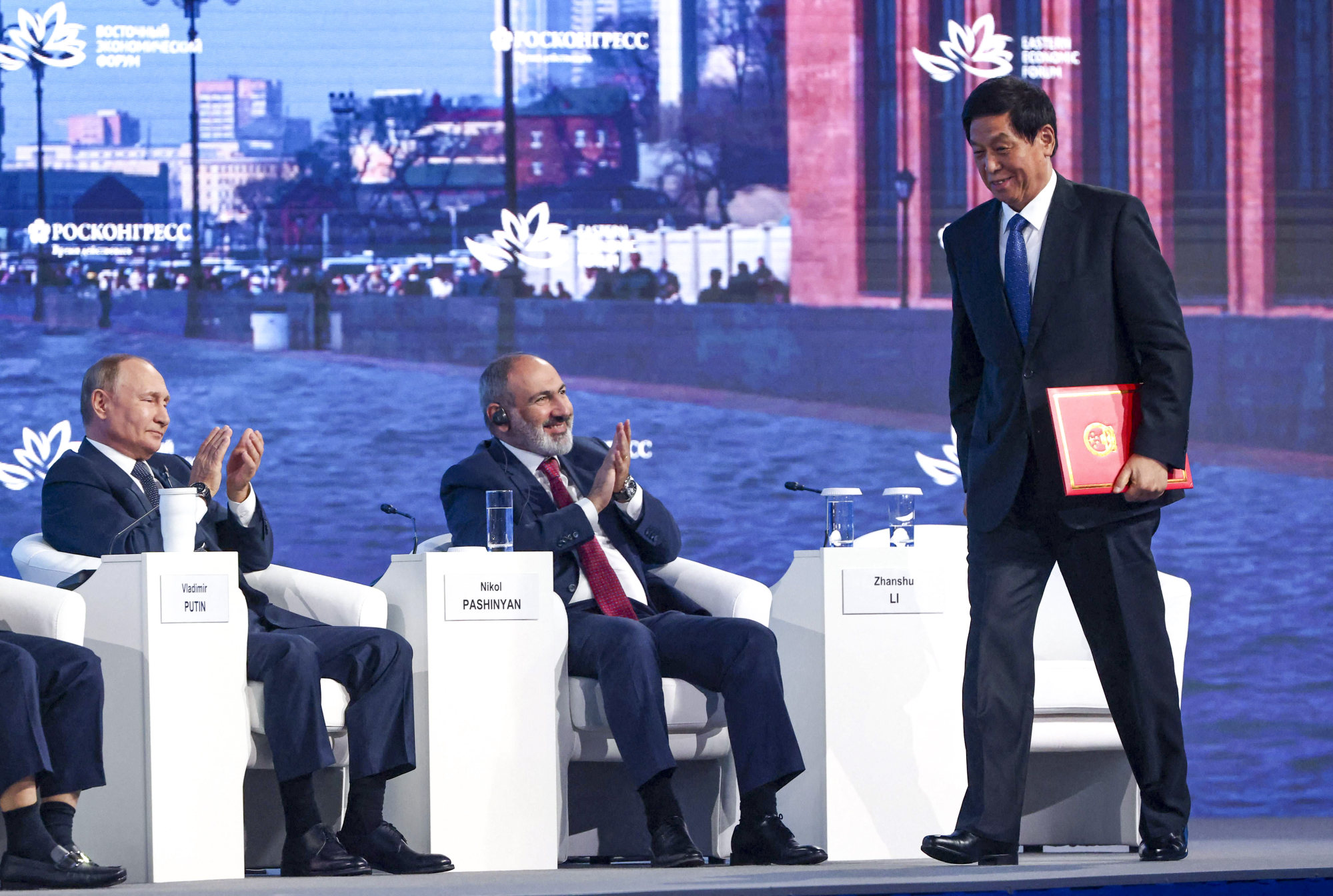
China’s top lawmaker praises ‘resilience’ of Russia’s sanctions-hit economy
- Beijing’s No 3 official, Li Zhanshu, is in Vladivostok to attend the Eastern Economic Forum, the first stop on an 11-day tour
- The most senior Chinese leader to travel abroad since the pandemic began, Li also met President Vladimir Putin on the sidelines
Beijing’s No 3 official met Russian President Vladimir Putin on the sidelines of the Eastern Economic Forum, which is held annually in the city in Russia’s Far East to encourage foreign investment in the region.
During their meeting, Putin told Li that he attached importance to the contributions of leaders from the two countries to further bilateral ties and thanked China for its support of Russia, according to the official video stream.
“The political trust, strategic coordination and pragmatic cooperation between the two countries have reached new heights,” Li said, before the live stream ended.

In a speech at the forum’s plenary session earlier, Li repeated Beijing’s opposition to unilateral sanctions and cutting supply chains and said China and Russia would not form an alliance.
“China is happy to see that under President Putin’s leadership, Russia’s economy did not collapse under harsh sanctions from the United States and the West. Instead, it has stabilised and showed resilience in a fairly short time,” he said.
He said Russia was rich in energy and resources, and that energy cooperation between the two countries would be “lasting and full of potential”.
Some Russian politicians and oligarchs have been targeted with sanctions for Russia’s invasion of Ukraine in February and intervening in foreign elections. China has also been sanctioned on human rights grounds, limiting its companies’ access to and trade with Western firms, banks and other financial institutions.
In addition to Russia, Li will travel to three other China-friendly countries – Mongolia, Nepal and South Korea – on the 11-day trip.
Alfred Wu, an associate professor at the National University of Singapore’s Lee Kuan Yew School of Public Policy, said the tour would be a positive note to end Li’s political career.
“The trip will also not be challenged by international media,” he said, adding that a visit to a European country, for example, would have drawn criticism as China’s ties with the region are strained over Taiwan and human rights in Xinjiang.
Li is expected to retire from the party leadership after the Communist Party congress in October, and from the chairmanship of the legislature in March.
At the forum in Vladivostok on Tuesday, Russian state-controlled natural gas giant Gazprom signed an agreement with state-owned China National Petroleum Corporation to pay for gas supplies to China in roubles and the yuan, Gazprom said. Putin later told the forum that the currencies would be used in equal proportions.
Trade between the two countries has been denominated mostly in US dollars and euros.
It comes as Gazprom delayed a reopening of the Nord Stream 1 natural gas pipeline to Europe, citing an oil leak in a turbine. It did not say when service would resume.
Finance ministers of the Group of Seven nations – Canada, France, Germany, Italy, Japan, the United Kingdom and the United States – agreed last Friday to cap the price of Russian oil.
Wu said China’s ties with Russia were challenging, despite an apparent united front.
“The relationship with Russia is very much disappointing. I think they have a very much transactional relationship,” Wu said. “They have a common enemy: the United States.”

On Wednesday, Russia’s outgoing ambassador to China Andrey Denisov told Russian media that demanding that Beijing stand unequivocally for Moscow would give “Chinese partners a certain discomfort”.
Denisov also said that Xi would meet Putin in Samarkand, Uzbekistan on the sidelines of the Shanghai Cooperation Organisation summit from September 15 to 16. The China-led regional security bloc comprises eight member states, four observers and five “dialogue partners” across Asia.
“This is part of a series of activities to strengthen ties with Russia that China has organised,” said Wan Qingsong, an associate research professor at East China Normal University’s Centre for Russian Studies in Shanghai. “It’s an important diplomatic posture.”
He said Li was using the Vladivostok forum to show support for Russia after Western sanctions were imposed over Ukraine, and that a meeting between Xi and Putin next week could be a chance to talk about plans to end the war.
Wan also said China needed Russia following US House Speaker Nancy Pelosi’s visit to Taiwan in August and the unprecedented military drills Beijing held in retaliation.
“The Taiwan Strait crisis to a large extent damaged China’s public position of active neutrality on the Russia-Ukraine conflict,” he said. “This shows that the security issues in Ukraine and Taiwan are linked.”
Li is expected to travel to Moscow to meet Russian leaders of the two legislative chambers: Federation Council chairwoman Valentina Matviyenko and Vyacheslav Volodin, the State Duma chairman.

